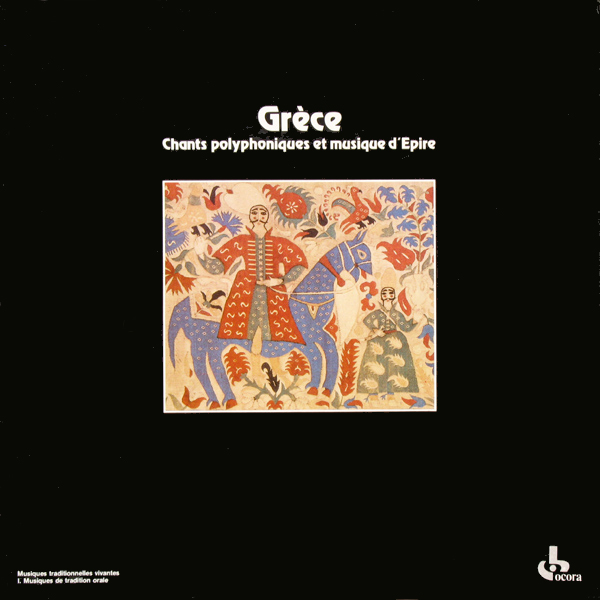00:00
Home / Her Work / Song Catalogue / The Love of Yannos and Marigo

Yannos and Marigo went to the same school.
Yannos could read and write, Marigo could sing.
They loved each other, no one knew it.
Yannos came to a decision and told his mother:
“Mother, I love Marigo and want to marry her”.
“What are you saying, my crazy son! What snake has bitten you!
Marigo is your cousin, your first cousin.
Rather speak to me of your winding sheet to bury you in
than of this alliance, of his marriage”.
Marigo was betrothed and Yannos died.
The wedding and the funeral processions intermingled along the way.
Of those at the wedding nobody asked a question.
Only Marigo dared to step forward and ask:
“Who is the deceased in this coffin?”
“It is Yannos, the deceased, in this gilded coffin”.
The fair one fainted away and soon died.
They were buried at the crossing of the wats.
The youth put forth a reed, the maid a cypress.
The reed bent over to one side and embraced the cypress.
Translated by Derek Yeld
Ο Γιάννος και η Μαριγώ σ’ ένα σχολειό πηγαίναν,
ο Γιάννος ξέρει γράμματα κι η Μαριγώ τραγούδια.
Τα δυο τους αγαπήθκανε, κανένας δεν το ξέρει.
Ο Γιάννος τ’ αποφάσισε της μάνας του το λέει.
«Μάνα μ’, τη Μάρω αγαπώ και θέλω να την πάρω».
«Τι λες, μωρέ παλιόπαιδο και φιδοφαγωμένο,
η Μάρω είν’ αξαδέλφη σου, πρώτη αξαδέρφισσά σου,
κάλλιο να κόψω σάβανο για να σε σαβανώσω,
παρά ν’ ακούσω στέφανα για να σε στεφανώσω».
Η Μάρω αρραβωνίζεται κι ο Γιάννος ξεψυχάει.
Συμπεθεριό και λείψανο στο δρόμο γίναν ένα.
Κανένας δεν ερώτησε από τους συμπεθέρους,
η Μάρω ξαντροπιάστηκε, στέκει και τους ρωτάει:
«Τίνος είναι το λείψανο με τη χρυσή την κάσα;»
«Του Γιάννου είναι το λείψανο με τη χρυσή την κάσα».
Λιγοθυμάει η λυγερή και του θανάτου πέφτει.
Τα πήραν και τα θάψανε σε ένα σταυροδρόμι.
Γιάννος φυτρώνει κάλαμος κι η κόρη κυπαρίσσι,
στριφογυρίζ’ ο κάλαμος φιλάει το κυπαρίσσι.
«Για ’δέστε τούτ’ αντρόγενο, το πολυαγαπημένο,
που δεν φιλήθηκε ζωντανό, φιλιέτ’ απεθαμένο».
Pogonisios is a characteristic dance from the Pogoni province of Epirus.
A homophonic song from Northern Epirus, among the most famous in the repertory for the unusual beauty of its words. Normally, only the first two or three verses are sung, but here the singers of Ktismata present the complete version.
The Love of Yannos and Marigo is one of the finest examples of Epirotic folk poetry. To explain and analyze its nineteen verses would require many pages, so densely is every word charged with meaning, poetry, and history. The poet —a worthy heir of his Dorian ancestors— speaks in a sober, concise language, narrating the story without betraying his own emotion.
Aris Fakinos (1984)
Many Greek paraloges (folk fables/narrative ballads) speak of the ill-fated loves of young people — a theme often tied to family despotism and criminal violence. As a genre of songs that invite reflection on social conditions and human nature, the lengthy paraloges achieve a multi-layered illumination and critique of moral codes, while revealing an ever-shifting stance toward good and evil. Their harsh stories, which —like sacred hymns— rehearse severe unwritten rules, must be heard and function as exempla; yet at the same time, every act of violence —even punishment itself— is ultimately judged as senseless and absurd, with the singer identifying with the victim.
To this category belong both the present song and others, such as As Long as the Shore and Giannos and Vangelio. In them, the unjust death of one lover is followed by the suicide of the other. In both cases, the mother is held responsible — a bearer of rigid morality but, as we now recognize, also of many psychological syndromes. The young are buried together, and from their neighbouring graves spring trees which, swayed by the wind, continue the tender embraces of the unfortunate lovers.
Miranda Terzopoulou (2008)
Note for the album Folk Fables in Song
Studio recording (1984).